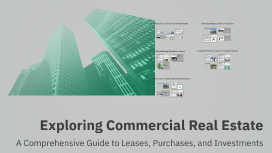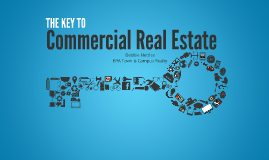Commercial Real Estate
Transcript: Introduction to Commercial Real Estate Understanding Commercial Leases Types of Commercial Leases Key Lease Terms Importance of Commercial Real Estate Overview of the Commercial Real Estate Market What is Commercial Real Estate? Key lease terms include Lease Duration (Term) Rent Increases (Escalations) Additional Rent (TMI) Renewal Options It is essential for tenants to fully understand these terms to prevent misunderstandings and ensure compliance throughout the lease period. There are three primary types of commercial leases: Gross Lease, where the landlord pays all property expenses; Net Lease, where the tenant covers some or all expenses; and Modified Gross Lease, which combines elements of both. Understanding these lease structures is crucial for financial planning. This sector contributes significantly to the economy by facilitating business operations, creating jobs, and generating tax revenues. In 2021, the commercial real estate market in the U.S. was valued at $20 trillion, highlighting its crucial role in economic stability. The commercial real estate market consists of a diverse range of property types and transaction types each influenced by specific economic factors. Currently, the trend is leaning towards e-commerce, prompting demand for industrial and warehouse spaces, while urban offices face challenges adapting post-pandemic. Commercial real estate generally refers to properties used exclusively for business activities, intended to generate profits through rental income or capital appreciation. It includes various types such as office buildings, retail spaces, industrial properties, and multi-family residences. Investment Potential Types of Transactions Types of Commercial Real Estate Tenant Obligations Landlord Rights The primary types include office spaces, retail properties, multifamily residential buildings, industrial spaces, and hospitality. Each type has distinct characteristics that influence investment strategies and market performance. Commercial real estate is often considered a lucrative investment option. It typically offers higher and most importantly more reliable returns compared to residential properties, attracting investors seeking to diversify their portfolios and hedge against inflation. Commercial lease Indusrtial Lease Purchase of investment properties Purchase of property for a business Purchase and sale of business Landlords maintain rights that include collecting rent, accessing the property for inspections, and enforcing lease terms. Understanding these rights ensures a balanced and fair landlord-tenant relationship within commercial leases. Tenants typically have obligations that include: timely rent payment property maintenance adhering to the zoning laws. Failure to meet these obligations can result in lease termination and potential legal issues. Understanding Industrial Leases Navigating the Purchase and Sale of Investment Properties Industrial Leasing Financing Options Types of Industrial Properties Analyzing Investment Opportunities Industrial Leasing is a sensitive matter with long term effects. Pay attehntion to: Term size Access Clear height Zoning mixture Electricity Parking There are various types of industrial properties, including manufacturing facilities, warehouses, distribution centers, and flex spaces. Each type serves different operational needs, catering to sectors such as logistics, production, and technology. Various financing options, including conventional loans, commercial mortgages, and private equity, can facilitate the purchase of investment properties. Each option has different interest rates, terms, and requirements which impact the overall investment strategy. Investment opportunities in real estate can be assessed using metrics such as return on investment (ROI), capitalization rates (Cap Rate), and market trends. Evaluating location, property condition, and potential tenant demand are essential to forecasting profitability. Due Diligence Process and Legal Considerations Closing Procedures Special Considerations The due diligence process involves a thorough assessment of the property, including title searches, inspection reports, and financial statements. Also There are legal aspects to be done through a trusted lawyer. Closing procedures for investment property transactions typically include finalizing financing, conducting the title transfer, and settling all associated costs. Understanding these steps is vital to ensuring a smooth transaction and avoiding legal pitfalls. When leasing industrial space, considerations like zoning regulations, accessibility to transportation, and environmental compliance are crucial. These factors ensure a property meets operational requirements and legal guidelines for the tenant's activities. Purchase of Commercial Property for Businesses Identifying Suitable Properties Evaluating Location and Market Conditions Begin the search by outlining specific business needs, including size, layout, and

















